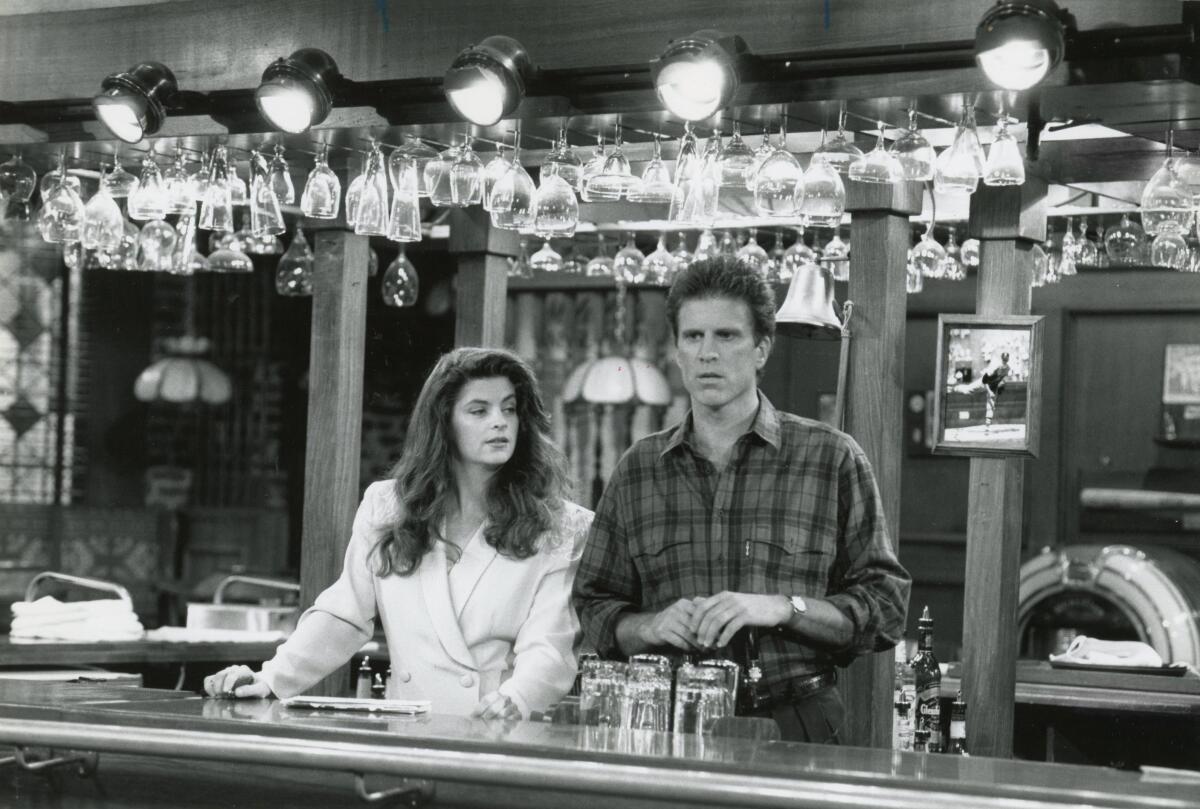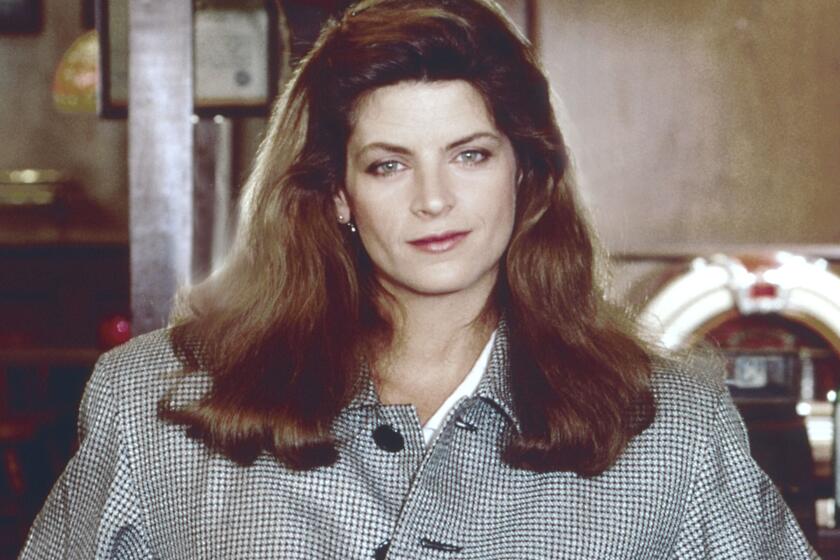Appreciation: How ‘Cheers’ stars Kirstie Alley and Ted Danson made one of TV’s most iconic pairings

- Share via
Many television series have lost and gained characters across their lifetime, but when Kirstie Alley took over from Shelley Long as the female lead of “Cheers” in 1987, it was something epochal, almost a reboot, a new lease on life. Long’s Diane Chambers was a runaway bride, cerebral, willowy, blond, mathematically fated to be mated with Ted Danson’s bartender-proprietor Sam Malone — and they were indeed together off and on through her five seasons.
As Rebecca Howe, who came into the series as Sam’s new boss — he had sold the bar to a conglomerate — Alley, who starred in the next six seasons, was something entirely different: dark, solid, physical, throaty, with a gift for slapstick and the license to go big where Long had been contained, and — to his endless frustration — not interested in Sam at all.
I have never seen any of the three “Look Who’s Talking” films that Alley, who died Monday at age 71, made with John Travolta during and just after the run of “Cheers,” but I can only assume that she’s great in them, because I never saw her otherwise, even in shows and parts that were less deserving of her presence, less supportive of her talent. “Cheers” is one of the best written comedies in television history, however, and the combination of actor and role created the part for which she is rightly best remembered.
Actor Kirstie Alley, of ‘Cheers’ fame, died of cancer that was recently diagnosed, according to a statement issued Monday evening by her family.
Rebecca’s main theme was thwarted ambition, professional and romantic — the two were mixed up in her head — limited by her own situational blindness and the corporate glass ceiling. (Sexual harassment and power relationships are repeatedly portrayed, if not exactly explored.) Watching the show now, its attitudes feel transitional: Sam is a dinosaur, whose sexual obsessiveness the series half celebrates, half critiques.
But there’s something especially interesting about his relationship with Rebecca. There’s no romance between them. His interest in her is entirely sexual — or psychosexual, driven by her lack of reciprocation — which leads ultimately to a complicated, often affecting, half-platonic friendship that had, and has, no parallel in television.
If Rebecca’s character runs a little too much to desperation in later seasons, when it comes to Landing a Man, it may have been in part that Alley was so obviously good at playing that kind of comedy, so engaging breaking down.
If thwarted ambition, physical comedy and the ability to cry funny put Alley in a line descended from Lucille Ball, she also had something of the strength and vulnerability, the rough-hewn intelligence and emotional appeal, of the great women of screwball comedy — Rosalind Russell, Barbara Stanwyck. (And like some of those stars, she could be acid on the subject of her industry, “the most suppressive business on the planet.” Asked how one remained a “hot property,” she replied, “You pour boiling water on yourself every morning.”)
She was primarily a comic actor, though she won her second Emmy, after “Cheers,” in a drama, the 1994 TV movie “David’s Mother,” as the mother of an autistic teenager, and I first saw her as Saavik, Spock’s protege in the 1982 film “Star Trek II: The Wrath of Khan,” her screen debut. (Not counting three episodes as a contestant on “Match Game.”) With her striking looks — green wide-set eyes and a superabundant head of hair, which she used as an expressive accessory — she was memorable from first glance, and unforgettable once she began to act.
‘Cheers’ stars Ted Danson, Kelsey Grammer and Rhea Perlman fondly remember their late castmate Kirstie Alley, who died of cancer at age 71.
Subsequent series did not bother to domesticate her. In the very good “Veronica’s Closet,” created by Marta Kauffman and David Crane of “Friends” fame, which ran from 1997 to 2000, she played the entrepreneurial success of Rebecca Howe’s dreams, the head of a lingerie company. In the less good, short-lived “Kirstie,” she starred as a Broadway star reunited uneasily with the unglamorous child she gave up for adoption decades earlier. And in the self-reflexive, semi-improvised “Fat Actress,” from 2005, she played a version of herself, trying to restart her career in the face of tabloid obsession with her weight.
Alley, who was also a regular in the second season of Ryan Murphy’s “Scream Queens,” continued to work in guest roles and on reality shows — this year’s edition of “The Masked Singer” was her last screen appearance. But there never was another “Cheers” or another “Look Who’s Talking” in her life, and there was never as much work as she should have had.
“What I want to do for the rest of my life is to work,” she told journalist Clive James in the 1989 British documentary “Postcard From Hollywood.” “And I think if you were like some bimbo, you know, that was like a flash in the dark that you probably would not have an opportunity to work for very long. But I don’t think I’m real bimbo-esque. If I get old and fat then I’ll do old, fat character roles, I don’t care. It’s fun.”
More to Read
The complete guide to home viewing
Get Screen Gab for everything about the TV shows and streaming movies everyone’s talking about.
You may occasionally receive promotional content from the Los Angeles Times.









